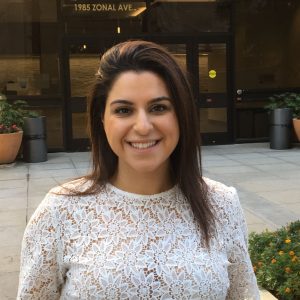
Why did you choose USC School of Pharmacy?
My path to USC was a bit unconventional. I actually only sent in one application for pharmacy school, and it was to USC. The innovation, education, accomplished alumni, and world-renowned faculty offered at USC School of Pharmacy presented an invaluable opportunity – I was investing in my future. I’ve always found myself to have a creative mind, and I knew that USC Mann would not only provide a highly developed educational program, but more importantly the opportunities to receive mentorship from and grow alongside the current and future leaders within the profession.
How have the resources and faculty available at USC helped you with your studies, learning, and growth?
I would not be where I am without the incredibly supportive faculty. They model themselves as true leaders as exemplified by garnering passion, fostering confidence and initiating intention within us as students. For example, Dr. Paul Beringer has provided me the opportunity to explore the realms of pharmaceutical translational research as my mentor through the Deans Summer Research. Dr. Ian Haworth and Dr. Rebecca Romero are prime examples of supportive faculty who tirelessly work to ensure our students are supported academically and emotionally. They served as instrumental players in initiating the Supplemental Instruction program, and this past summer I had the opportunity to work with them, Ph.D. Candidate Dab Brill, and Irene Chen on the development a self-directed online learning tool for first year students.
What is one of the best experiences you’ve had at USC Mann so far?
The people- my peers. I love telling this story. The first day of school changed my life forever. Eliza Asherian, a classmate who I had not met before, introduced herself to me. We both are commuters to the campus, and within minutes of meeting she grabbed my phone, entered her phone number and insisted we drive to school together. Little did I know I would meet my best friend and greatest supporter at USC. People to this day are still shocked that we met at USC because we act like sisters who have been friends for years. This story speaks volumes to the qualities and characteristics of the compassionate individuals at this school.
Why should prospective students consider USC School of Pharmacy?
It is at USC School of Pharmacy where your visions will become goals and your goals will become realities. In order to be successful when undertaking any endeavor, we as the future leaders of the profession need to work together and be innovative. As Einstein said,“We cannot solve problems we have created with the same thinking that created them.” By surrounding yourself with USC faculty and student leaders whose aim is to advance the profession, you will be afforded the challenge to pioneer and collaborate on groundbreaking developments.
What are your plans after graduation?
My goal is to pursue a career in academia and practice clinical pharmacy in an acute care setting. I have always had a passion for teaching, and I strive to facilitate learning with future student pharmacists just like my professors have done for me.
What is the importance of USC’s alumni network?
The “Trojan Family” is not just a term, it is a reality. By joining the USC network, you not only gain a “pharmily” but also gain brothers and sisters within other professions including medicine, occupational therapy, law, business, and social work. You have access to the smartest, most imaginative and capable minds, and upon realizing this power and potential, the opportunities are endless.
You helped start the Supplemental Instruction program! Could you tell us about the program and the planning that went into it?
Last summer I worked with faculty members and administration including Dr. Haworth and Interim Dean Dr. Glen Stimmel to develop the Supplemental Instruction program for first-year students. Supplemental Instruction utilizes peer-facilitated, self-directed learning sessions to improve academic success in high-risk courses. The program is altruistic in nature and aims to establish a cohesive learning environment where students help their peers succeed. By fostering an active-learning environment, students learn how to integrate course content and study skills while working with their peers. This program aims to not only assist the first year students academically, but also offer the supplemental instructors the opportunity to learn how to effectively communicate.
As future pharmacists, we have a duty to our patients to educate them on their medications and disease states in order to improve health outcomes. Understanding how to effectively teach various learning styles is important for each of us whether we are community pharmacists, preceptors, or professors.

